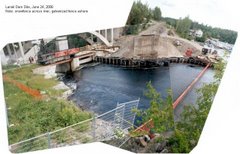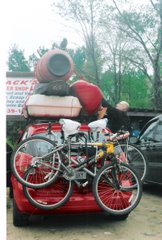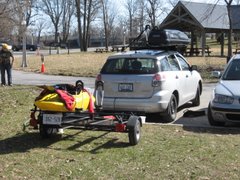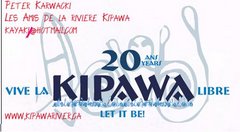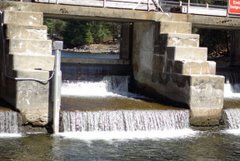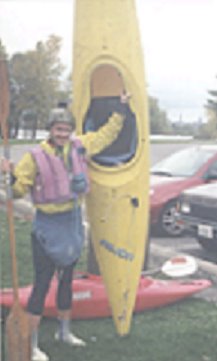So... somebody is lying.
see article
The testator said: "I think Canadians need to know that behind the scenes, the Prime Minister's Office has apparently attempted to silence a legitimate voice and a critic of the proposed Enbridge oil tanker and pipeline project," he said.
Sources:
Affidavit accuses Prime Minister’s Office of threatening environmental charity http://www.globaltvbc.com/canada/affidavit+accuses+prime+ministers+office+of+threatening+environmental+charity/6442566233/story.html
Environmentalist’s departure sheds light on tension felt by green groups http://www.theglobeandmail.com/news/politics/activists-dismissal-raises-the-temperature-in-pipeline-debate/article2313991/
Attack on “radicals” sign of tougher federal strategy http://www.cbc.ca/news/canada/british-columbia/story/2012/01/11/pol-gateway-pipeline-strategy.html
Feds list First Nations, green groups as oilsands “adversaries” http://www.vancouversun.com/business/Feds+list+First+Nations+green+groups+oilsands+adversaries/6054920/story.html
”Scary time” for Canada http://www.vancouverobserver.com/sustainability/2012/01/25/scary-time-canada
Canadian pipeline needs aboriginal consent: chief http://www.reuters.com/article/2012/01/25/us-aboriginals-idUSTRE80O1SC20120125
Save the Fraser Declaration http://savethefraser.ca
Whistleblower’s Open Letter to Canadians http://www.scribd.com/doc/79228736/Whistleblower-s-Open-Letter-to-Canadians
PMO branded environmental group an ‘enemy’ of Canada, affidavit says http://www.thestar.com/news/article/1120800--pmo-branded-environmental-group-an-enemy-of-canada-affidavit-says
Affidavit accuses Prime Minister's Office of threatening environmental charity http://www.winnipegfreepress.com/arts-and-life/life/greenpage/affidavit-accuses-prime-ministers-office-of-threatening-environmental-charity-137994418.html
Affidavit accuses PMO of threatening environmental group http://www.ctv.ca/CTVNews/Canada/20120124/pmo-affidavit-environment-120124/
Friday, January 27, 2012
Thursday, January 26, 2012
The Costa Concordia: Is this the metaphor and portent for things to come in 2012
A large ship, seemingling unstoppable, capital intensive, multinational in scope, about to keel over, and notice the life boats heading for "who knows where".
IS SHALE GAS THE ANSWER TO OUR ENERGY NEEDS?
Jeff Rubin, (author of the book "why your world is about to get a whole lot smaller" in this interview
http://www.theglobeandmail.com/report-on-business/video/is-shale-gas-a-game-changer/article1868254/
in the Globe and Mail says not: depletion rates are too high and well head costs are too high relative to the current low price of gas.
Also consider this comment from
Juan Peron
12:22 PM on January 13, 2011
This comment is hidden because you have chosen to ignore Juan Peron. Show DetailsHide Details
Shale oil is extracted through hydraulic fracturing (fracking). The process pumps water and chemicals into the ground at a pressurized rate exceeding what the bedrock can withstand, resulting in a microquake that produces rock fractures.
According to an article by Rady Ananda, fracking has been used in Arkansas for some time with a tremendous increase in earthquake frequency following advanced drilling. There were thirty-eight earthquakes in Arkansas in 2009, and more in 2010 than in all of the twentieth century. There has been a 1,200% increase in earthquakes over 2009 in the last four months of 2010.
The recent, well-publicized deaths of thousands of birds happened in the shale extraction area of Arkansa. An earthquake of whatever scale can release a stream or cloud of gas and fracking chemicals which could easily explain why sleeping birds would suddenly take flight, and then quickly die as they succumbed to the toxic fumes. Hundreds of thousands of dead fish along the Arkansas River likely died from the same cause.
Dead fish, dead birds, and earthquakes. Are these the disasters that we are bringing to Canada?
The evidence we see today is the sudden drop in price of CARBO CERAMICS, the primary producer of fracking materials/propants.
By comparison, take a look at Westport Innovations, makers of natural gas powered engines:
By this logic, Wesport would go to the moon, if only gas prices would go to zero.
Of course, if the argument in favour of Shale Gas and Wesport had nothing to do with making money and EVERYTHING to do with building resliency in the economy then this all makes sense.
The question is what does the participation of the MIC and other related government agencies look like? If it is high, then it is reasonable to assume these companies will continue to grow.
http://www.theglobeandmail.com/report-on-business/video/is-shale-gas-a-game-changer/article1868254/
in the Globe and Mail says not: depletion rates are too high and well head costs are too high relative to the current low price of gas.
Also consider this comment from
Juan Peron
12:22 PM on January 13, 2011
This comment is hidden because you have chosen to ignore Juan Peron. Show DetailsHide Details
Shale oil is extracted through hydraulic fracturing (fracking). The process pumps water and chemicals into the ground at a pressurized rate exceeding what the bedrock can withstand, resulting in a microquake that produces rock fractures.
According to an article by Rady Ananda, fracking has been used in Arkansas for some time with a tremendous increase in earthquake frequency following advanced drilling. There were thirty-eight earthquakes in Arkansas in 2009, and more in 2010 than in all of the twentieth century. There has been a 1,200% increase in earthquakes over 2009 in the last four months of 2010.
The recent, well-publicized deaths of thousands of birds happened in the shale extraction area of Arkansa. An earthquake of whatever scale can release a stream or cloud of gas and fracking chemicals which could easily explain why sleeping birds would suddenly take flight, and then quickly die as they succumbed to the toxic fumes. Hundreds of thousands of dead fish along the Arkansas River likely died from the same cause.
Dead fish, dead birds, and earthquakes. Are these the disasters that we are bringing to Canada?
The evidence we see today is the sudden drop in price of CARBO CERAMICS, the primary producer of fracking materials/propants.
By comparison, take a look at Westport Innovations, makers of natural gas powered engines:
By this logic, Wesport would go to the moon, if only gas prices would go to zero.
Of course, if the argument in favour of Shale Gas and Wesport had nothing to do with making money and EVERYTHING to do with building resliency in the economy then this all makes sense.
The question is what does the participation of the MIC and other related government agencies look like? If it is high, then it is reasonable to assume these companies will continue to grow.
Wednesday, January 25, 2012
Raging Grannies take on updating the Canadian Environmental Assessment Act
Inky Dinky Parlez-vous?
for more details: see the Canadian Environmental Network site... while it still exists!
http://rcen.ca/action-alerts/action-alert-canada-s-environmental-assessment-law-is-under-attack
for the full newsrelease; see below
Online, complete with Raging Grannies video, at:
http://rcen.ca/action-alerts/action-alert-canada-s-environmental-assessment-law-is-under-attack
Action Alert: Canada’s Environmental Assessment Law Is Under Attack
January, 2012
The Harper Government wants to gut the Canadian Environmental Assessment
Act.
Tell the Conservatives that Canada’s environment matters – and
environmental laws matter.
Tell Prime Minister Harper, Environment Minister Kent, and Natural
Resources Minister Oliver we won’t accept shoddy “streamlined” public
reviews and destructive megaprojects – even if they change the law to
allow them to proceed.
Background
The Canadian Environmental Assessment Act (CEAA) is one of the most
important pieces of environmental legislation in Canada. It often
provides for more public participation and a more rigorous review than
provincial assessment legislation, and in many cases covers projects not
subject to provincial assessment at all. The Act has been in place since
1995.
CEAA was intended to promote sustainable development by forcing federal
authorities to make sure that an environmental assessment was done on
any projects they were required to authorise. It worked, but it did have
a number of problems that environmental groups, aboriginal
organisations, and government agencies have tried to resolve over the
years. Many of the problems have been resolved. For example,
harmonization agreements between federal and provincial governments
allow them to undertake joint reviews that meet both their requirements,
while reducing duplication and confusion for proponents and the public.
Other problems have never been resolved; for example, the Act is centred
on assessing the environmental impacts of physical projects, so
government policies, plans, and programs are not included – things like
fisheries policies, regional development plans, or plans for disposing
of high-level nuclear fuel waste. The review process also suffered
resistance from some government departments, such as Fisheries and
Oceans, that didn’t want to take responsibility for larger environmental
issues. MiningWatch Canada had to go all the way to the Supreme Court to
ensure that assessments could not be artificially defined to limit their
scope and avoid the Act’s public involvement requirements. And it
suffered periodic setbacks, especially when the Navigable Waters
Protection Act was amended in 2009 to exclude it from CEAA, and CEAA
itself amended in 2010 to exclude projects funded under the government’s
Economic Action Plan from environmental assessment.
The Environmental Planning and Assessment Caucus of the Canadian
Environment Network has continued working hard to engage the public and
develop thoughtful, evidence-based proposals for a better federal EA
process, and has produced a significant body of research and documentation.
CEAA Under Review
The Act includes a requirement for Parliament to review it by June 2010.
However, the government did no public preparation for the review and the
House of Commons Standing Committee on Environment and Sustainable
Development only started working on it in October, 2011. The Committee
held a scant five weeks of public hearings – nine sessions of less than
two hours each, with witnesses allowed all of ten minutes to make their
initial presentations, and only two days’ notice of the final deadline
for written submissions. The Committee has not yet published its report.
This is a stark contrast with the previous review of the Act, which
included extensive public consultations, government discussion papers,
and thorough public discussions in the Standing Committee.
Meanwhile, Stephen Harper, Peter Kent, and Joe Oliver have all made
public pronouncements about the environmental assessment process taking
too long, creating uncertainty for investors, and threatening economic
development. It is clear from their statements as well as from industry
talking points – and a leaked government document – that the government
is eager to reduce the scope and effectiveness of the federal
environmental assessment process if it can’t eliminate it altogether.
Small projects would be no longer be screened, and the assessment of
large projects will be “delegated” – no longer handled by the Canadian
Environmental Assessment Agency. Some are already handled (badly) by the
National Energy Board and the Nuclear Safety Commission, and this could
be extended to other federal and even provincial agencies, resulting in
an inconsistent patchwork of reviews, incomprehensible to the public –
and ineffective in protecting the public interest – the environment and
people’s livelihoods.
What You Can Do
Please write to Environment Minister Peter Kent to express your concerns
about the federal government’s intention to weaken federal environmental
assessment laws and undermine sustainable development in Canada. Send
copies to Prime Minister Harper, Natural Resources Minister Joe Oliver,
and the opposition parties’ environment critics, as well as your own
Member of Parliament. Engage your MP in discussion on this issue as most
of them know little about it and don’t realise its importance.
Most importantly, talk to your neighbours, friends, even strangers.
People have put a lot of hard work into trying to create and
environmental assessment process that protects the environment from
inappropriate development projects and gives the public a say in
development. We will not accept a review process that is “streamlined”
to limit public participation and ensure that potentially destructive
megaprojects proceed without serious consideration of their impacts –
and without those safeguards in place we will not accept the projects
themselves.
The following is a draft letter that you can send to Environment
Minister Peter Kent.
• If you can, personalize your message by adding information about your
own specific concerns. This could relate to a particular type of
development projects, a particular environmental assessment, or other
sustainable development issues.
• Make sure to send a copy to your own Member of Parliament.
• Below the letter, you will find a list of the relevant addresses,
phone/fax numbers, and e-mails.
Dear Minister Kent,
Don’t trash the Canadian Environmental Assessment Act! This law is
critical to understanding and mitigating the adverse environmental
effects of developments such as pipelines, tar sands projects, and
mines. Eliminating legal requirements and limiting public participation
in project reviews makes environmental disasters such as BP’s Deepwater
Horizon, Exxon Valdez, and Fukushima more likely. I know that you don’t
want catastrophes like these to happen in Canada.
That’s why I am urging you to work with Parliament to strengthen the
Canadian Environmental Assessment Act to make it more effective,
efficient, and open to public participation.
Canadians want all development projects to be sustainable, and a
stronger environmental assessment law – not a weaker one – is key to
achieving that goal.
Thank you for considering my views.
Sincerely,
[your name here]
cc: The Right Hon. Stephen Harper, Prime Minister of Canada
The Hon. Joe Oliver, Minister of Natural Resources
Megan Leslie, MP, NDP Environment Critic
Kirsty Duncan, MP, Liberal Environment Critic
Maria Mourani, MP, Bloc Québecois Environment Critic
Elizabeth May, Leader of the Green Party
To find your Member of Parliament, use the Parliamentary directory at
http://www.parl.gc.ca/SenatorsMembers.aspx?Language=E.
Mail may be sent postage-free to any Member of Parliament at the
following address:
House of Commons
Ottawa, Ontario
K1A 0A6
The Honourable Peter Kent
Minister of the Environment
Tel. (613) 992-0253
Fax: (613) 992-0887
Peter.Kent@parl.gc.ca
The Right Hon. Stephen Harper
Prime Minister of Canada
Tel. (613) 992-4211
Fax: (613) 941-6900
Stephen.Harper@parl.gc.ca
The Honourable Joe Oliver
Minister of Natural Resources
Tel. (613) 992-6361
Fax: (613) 992-9791
Joe.Oliver@parl.gc.ca
Megan Leslie
Tel. (613) 995-7614
Fax: (613) 992-8569
Megan.Leslie@parl.gc.ca
Kirsty Duncan
Tel. (613) 995-4702
Fax: (613) 995-8359
Kirsty.Duncan@parl.gc.ca
Maria Mourani
Tel. (613) 992-0983
Fax: (613) 992-1932
Maria.Mourani@parl.gc.ca
Elizabeth May
Tel. (613) 996-1119
Fax: (613) 996-0850
Elizabeth.May@parl.gc.ca
--
Jamie Kneen, Communications & Outreach Coordinator, MiningWatch Canada
http://www.miningwatch.ca/
Raging Grannies sing the CEAA Blues from MiningWatch on Vimeo.
for more details: see the Canadian Environmental Network site... while it still exists!
http://rcen.ca/action-alerts/action-alert-canada-s-environmental-assessment-law-is-under-attack
for the full newsrelease; see below
Online, complete with Raging Grannies video, at:
http://rcen.ca/action-alerts/action-alert-canada-s-environmental-assessment-law-is-under-attack
Action Alert: Canada’s Environmental Assessment Law Is Under Attack
January, 2012
The Harper Government wants to gut the Canadian Environmental Assessment
Act.
Tell the Conservatives that Canada’s environment matters – and
environmental laws matter.
Tell Prime Minister Harper, Environment Minister Kent, and Natural
Resources Minister Oliver we won’t accept shoddy “streamlined” public
reviews and destructive megaprojects – even if they change the law to
allow them to proceed.
Background
The Canadian Environmental Assessment Act (CEAA) is one of the most
important pieces of environmental legislation in Canada. It often
provides for more public participation and a more rigorous review than
provincial assessment legislation, and in many cases covers projects not
subject to provincial assessment at all. The Act has been in place since
1995.
CEAA was intended to promote sustainable development by forcing federal
authorities to make sure that an environmental assessment was done on
any projects they were required to authorise. It worked, but it did have
a number of problems that environmental groups, aboriginal
organisations, and government agencies have tried to resolve over the
years. Many of the problems have been resolved. For example,
harmonization agreements between federal and provincial governments
allow them to undertake joint reviews that meet both their requirements,
while reducing duplication and confusion for proponents and the public.
Other problems have never been resolved; for example, the Act is centred
on assessing the environmental impacts of physical projects, so
government policies, plans, and programs are not included – things like
fisheries policies, regional development plans, or plans for disposing
of high-level nuclear fuel waste. The review process also suffered
resistance from some government departments, such as Fisheries and
Oceans, that didn’t want to take responsibility for larger environmental
issues. MiningWatch Canada had to go all the way to the Supreme Court to
ensure that assessments could not be artificially defined to limit their
scope and avoid the Act’s public involvement requirements. And it
suffered periodic setbacks, especially when the Navigable Waters
Protection Act was amended in 2009 to exclude it from CEAA, and CEAA
itself amended in 2010 to exclude projects funded under the government’s
Economic Action Plan from environmental assessment.
The Environmental Planning and Assessment Caucus of the Canadian
Environment Network has continued working hard to engage the public and
develop thoughtful, evidence-based proposals for a better federal EA
process, and has produced a significant body of research and documentation.
CEAA Under Review
The Act includes a requirement for Parliament to review it by June 2010.
However, the government did no public preparation for the review and the
House of Commons Standing Committee on Environment and Sustainable
Development only started working on it in October, 2011. The Committee
held a scant five weeks of public hearings – nine sessions of less than
two hours each, with witnesses allowed all of ten minutes to make their
initial presentations, and only two days’ notice of the final deadline
for written submissions. The Committee has not yet published its report.
This is a stark contrast with the previous review of the Act, which
included extensive public consultations, government discussion papers,
and thorough public discussions in the Standing Committee.
Meanwhile, Stephen Harper, Peter Kent, and Joe Oliver have all made
public pronouncements about the environmental assessment process taking
too long, creating uncertainty for investors, and threatening economic
development. It is clear from their statements as well as from industry
talking points – and a leaked government document – that the government
is eager to reduce the scope and effectiveness of the federal
environmental assessment process if it can’t eliminate it altogether.
Small projects would be no longer be screened, and the assessment of
large projects will be “delegated” – no longer handled by the Canadian
Environmental Assessment Agency. Some are already handled (badly) by the
National Energy Board and the Nuclear Safety Commission, and this could
be extended to other federal and even provincial agencies, resulting in
an inconsistent patchwork of reviews, incomprehensible to the public –
and ineffective in protecting the public interest – the environment and
people’s livelihoods.
What You Can Do
Please write to Environment Minister Peter Kent to express your concerns
about the federal government’s intention to weaken federal environmental
assessment laws and undermine sustainable development in Canada. Send
copies to Prime Minister Harper, Natural Resources Minister Joe Oliver,
and the opposition parties’ environment critics, as well as your own
Member of Parliament. Engage your MP in discussion on this issue as most
of them know little about it and don’t realise its importance.
Most importantly, talk to your neighbours, friends, even strangers.
People have put a lot of hard work into trying to create and
environmental assessment process that protects the environment from
inappropriate development projects and gives the public a say in
development. We will not accept a review process that is “streamlined”
to limit public participation and ensure that potentially destructive
megaprojects proceed without serious consideration of their impacts –
and without those safeguards in place we will not accept the projects
themselves.
The following is a draft letter that you can send to Environment
Minister Peter Kent.
• If you can, personalize your message by adding information about your
own specific concerns. This could relate to a particular type of
development projects, a particular environmental assessment, or other
sustainable development issues.
• Make sure to send a copy to your own Member of Parliament.
• Below the letter, you will find a list of the relevant addresses,
phone/fax numbers, and e-mails.
Dear Minister Kent,
Don’t trash the Canadian Environmental Assessment Act! This law is
critical to understanding and mitigating the adverse environmental
effects of developments such as pipelines, tar sands projects, and
mines. Eliminating legal requirements and limiting public participation
in project reviews makes environmental disasters such as BP’s Deepwater
Horizon, Exxon Valdez, and Fukushima more likely. I know that you don’t
want catastrophes like these to happen in Canada.
That’s why I am urging you to work with Parliament to strengthen the
Canadian Environmental Assessment Act to make it more effective,
efficient, and open to public participation.
Canadians want all development projects to be sustainable, and a
stronger environmental assessment law – not a weaker one – is key to
achieving that goal.
Thank you for considering my views.
Sincerely,
[your name here]
cc: The Right Hon. Stephen Harper, Prime Minister of Canada
The Hon. Joe Oliver, Minister of Natural Resources
Megan Leslie, MP, NDP Environment Critic
Kirsty Duncan, MP, Liberal Environment Critic
Maria Mourani, MP, Bloc Québecois Environment Critic
Elizabeth May, Leader of the Green Party
To find your Member of Parliament, use the Parliamentary directory at
http://www.parl.gc.ca/SenatorsMembers.aspx?Language=E.
Mail may be sent postage-free to any Member of Parliament at the
following address:
House of Commons
Ottawa, Ontario
K1A 0A6
The Honourable Peter Kent
Minister of the Environment
Tel. (613) 992-0253
Fax: (613) 992-0887
Peter.Kent@parl.gc.ca
The Right Hon. Stephen Harper
Prime Minister of Canada
Tel. (613) 992-4211
Fax: (613) 941-6900
Stephen.Harper@parl.gc.ca
The Honourable Joe Oliver
Minister of Natural Resources
Tel. (613) 992-6361
Fax: (613) 992-9791
Joe.Oliver@parl.gc.ca
Megan Leslie
Tel. (613) 995-7614
Fax: (613) 992-8569
Megan.Leslie@parl.gc.ca
Kirsty Duncan
Tel. (613) 995-4702
Fax: (613) 995-8359
Kirsty.Duncan@parl.gc.ca
Maria Mourani
Tel. (613) 992-0983
Fax: (613) 992-1932
Maria.Mourani@parl.gc.ca
Elizabeth May
Tel. (613) 996-1119
Fax: (613) 996-0850
Elizabeth.May@parl.gc.ca
--
Jamie Kneen, Communications & Outreach Coordinator, MiningWatch Canada
http://www.miningwatch.ca/
Tuesday, January 24, 2012
Monday, January 23, 2012
GUNS, GOLD, and a GETAWAY PLAN : Okay - Where would you run to?
Gonzola Lira, born and raised under the Pinochet dictatorship in Chile has recently said that media censorship in the US is more profound that it was in Chile under Pinochet.
The question raised was: well? where do you run?
There are very few options:
According to this article from CBC, the world can be a very unsafe place.
The information comes from the government of Canada's External Affairs own site:
Interesting the home of the brave and land of the free, the USA shows up as a vibrant green zone, just as long as your name isn't Mahar Arar ( who was kidnapped by the US government, and sent to Syria for torture. Oh yes, and there is still that pesky Guantanamo Bay prison in Cuba. Private Manning is still being held in detention after a year, with out charge or arrest after releasing informaiton to Wikileaks. And so on...
Foreign Affairs, offers this advice about entering the USA:
Your rights when entering the U.S.
Under U.S. law, foreign nationals do not have the same rights as American citizens. When attempting to enter the U.S. (border crossing or airport) and while a determination is being made by U.S. authorities on your admissibility, you could be held for an extended period of time. If you are deemed inadmissible, there may be delays before you are returned to your point of departure or country of nationality.
So much is happening in the USA in the name of "national security interests" it is wise to pause and consider the implications on travel in general.
See John Pilger's Film "War on Democracy"
at 1:05:38 "National Security Interests... Like it or Lump it"
Daniel Clarridge former CIA director tells it like it is:
A truly frightening admonition.
Foreign Affairs doesn't offer any opinion on Canada but in my estimation, Canada still has rule of law, even though a majority government is essentially a dictatorship. The fusion of Corporate power and Government is reasonably obvious especially as the environmental issues around the tar sands and the Northern Pipeline become known. Fascism is growing but Canadians know it as something else, more benign, like "corporate sponsorship" or "lobbying", so much more comforting.
But the answers are not exactly clear. Gonzola's own site seeks to counsel people on their own relocation - for a nominal fee.
I'm thinking Canada is still a good bet: too bad about the weather ( six months of the year) but its much better in Ottawa than it is in Winnipeg, and the summer has no mosquitos to speak of.
There is, of course, one tiny problem and a roadmap of the country will pretty much spell it out:
The network of fourway, high capacity highways leading to Canada from the the United States is very significant. In many cases, the roads up from the US are 4 lane and the roads into Canada are 2 lane.
So despite our complacency about living in Canada once the "shit hits the fan" we may find we have a lot of new neighbors we didn't count on.
The question raised was: well? where do you run?
There are very few options:
According to this article from CBC, the world can be a very unsafe place.
The information comes from the government of Canada's External Affairs own site:
Interesting the home of the brave and land of the free, the USA shows up as a vibrant green zone, just as long as your name isn't Mahar Arar ( who was kidnapped by the US government, and sent to Syria for torture. Oh yes, and there is still that pesky Guantanamo Bay prison in Cuba. Private Manning is still being held in detention after a year, with out charge or arrest after releasing informaiton to Wikileaks. And so on...
Foreign Affairs, offers this advice about entering the USA:
Your rights when entering the U.S.
Under U.S. law, foreign nationals do not have the same rights as American citizens. When attempting to enter the U.S. (border crossing or airport) and while a determination is being made by U.S. authorities on your admissibility, you could be held for an extended period of time. If you are deemed inadmissible, there may be delays before you are returned to your point of departure or country of nationality.
So much is happening in the USA in the name of "national security interests" it is wise to pause and consider the implications on travel in general.
See John Pilger's Film "War on Democracy"
at 1:05:38 "National Security Interests... Like it or Lump it"
Daniel Clarridge former CIA director tells it like it is:
A truly frightening admonition.
Foreign Affairs doesn't offer any opinion on Canada but in my estimation, Canada still has rule of law, even though a majority government is essentially a dictatorship. The fusion of Corporate power and Government is reasonably obvious especially as the environmental issues around the tar sands and the Northern Pipeline become known. Fascism is growing but Canadians know it as something else, more benign, like "corporate sponsorship" or "lobbying", so much more comforting.
But the answers are not exactly clear. Gonzola's own site seeks to counsel people on their own relocation - for a nominal fee.
I'm thinking Canada is still a good bet: too bad about the weather ( six months of the year) but its much better in Ottawa than it is in Winnipeg, and the summer has no mosquitos to speak of.
There is, of course, one tiny problem and a roadmap of the country will pretty much spell it out:
The network of fourway, high capacity highways leading to Canada from the the United States is very significant. In many cases, the roads up from the US are 4 lane and the roads into Canada are 2 lane.
So despite our complacency about living in Canada once the "shit hits the fan" we may find we have a lot of new neighbors we didn't count on.
Subscribe to:
Comments (Atom)
Useful Links
- Mount Gox - Bitcoin exchange
- Reggie Middleton's Rapier Analysis
- Ontario Rivers Alliance
- Geodesic Dome Construction
- Canadian Disaster Preparedness
- Globe and Mail
- Chris' The Weekly Telegram
- Michael Rupert of CollapseNet
- Max Keiser
- Nicole Foss Blog - the automatic earth
- Peak Moment Discussions
- Scotia Mocatta Bullion Store
- Dimitry Orlov - Peak Moment Discussions
- Jims's ISFCR Blog
- Jenny Right Side Blog
- Scott Sorensen
Alternative Energy Sites I like
The Queen is not amused!

http://www.ispeakforcanadianrivers.ca/
The Ashlu river: it could happen to you

Whitewater Ontario

Working Hard to Protect Canada's Paddling Resources
Whitewater Ontario - Mission Statement
It is Whitewater Ontario’s mission to support the whitewater paddling community through the promotion, development and growth of the sport in its various disciplines.
We accomplish this through the development of events, resources, clubs, and programs for personal and athletic development, regardless of skill level or focus, to ensure a high standard of safety and competency;
We advocate safe and environmentally responsible access and use of Ontario’s rivers.
Whitewater Ontario is the sport governing body in the province, and represents provincial interests within the national body Whitewater Canada and the Canadian Canoe Association
http://www.whitewaterontario.ca/page/mission.asp
Kipawa, Tabaret, and Opemican
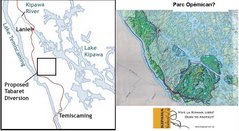
If Hydro Quebec is not actively pursuing Tabaret what is that bite out of Opemican for?
Kipawa Dam: After

Laniel Dam at 2006 Rally
Where is the Kipawa
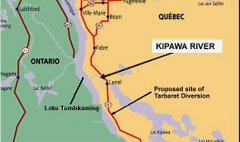
Kipawa flows into lake Temiskamingue, running from Kipawa Lake, under hwy 101 in Quebec
Kipawa Dam

laniel dam at 2004 River Rally
Tabaret is a Bad Idea
About the Kipawa
The best thing paddlers can do to help the cause of the Kipawa:
1. attend the rally and bring others including non paddlers to attend and buy beer and have fun
2. write your MP /MNA and raise the issue and post your objections -1 letter = 200 who didn't write
3. Write Thierry Vandal the CEO of Hydro Quebec strongly opposing the 132 MW standard decrying the use of "diversion" as the most environmentally inappropriate method of power production
4. Write Jean Charest, Premier of Quebec protesting that either the algonquin or the tabaret project will eliminate all other values on the Kipawa River by turning it into a dry gulch.
5. See if you can get other allied groups interested by showing your own interest, ie the Sierra Defense Fund, Earthwild, MEC, and so on.
6. Demand further consultation
7. Currently we are at the point where we need to sway public opinion and raise awareness.
However, if all else fails, don't get mad, simply disrupt, foment, and protest . The Monkey Wrench Gang.
Have you read Edward Abbey?
Important Addresses
CEO,Hydro Québec, 75 boul René Levesque, Montreal, P.Q., H2Z 1A4Caille.andre@hydro.qc.ca
The best thing paddlers can do to help the cause of the Kipawa:
1. attend the rally and bring others including non paddlers to attend and buy beer and have fun
2. write your MP /MNA and raise the issue and post your objections -1 letter = 200 who didn't write
3. Write Thierry Vandal the CEO of Hydro Quebec strongly opposing the 132 MW standard decrying the use of "diversion" as the most environmentally inappropriate method of power production
4. Write Jean Charest, Premier of Quebec protesting that either the algonquin or the tabaret project will eliminate all other values on the Kipawa River by turning it into a dry gulch.
5. See if you can get other allied groups interested by showing your own interest, ie the Sierra Defense Fund, Earthwild, MEC, and so on.
6. Demand further consultation
7. Currently we are at the point where we need to sway public opinion and raise awareness.
However, if all else fails, don't get mad, simply disrupt, foment, and protest . The Monkey Wrench Gang.
Have you read Edward Abbey?
Important Addresses
CEO,Hydro Québec, 75 boul René Levesque, Montreal, P.Q., H2Z 1A4Caille.andre@hydro.qc.ca
Tabaret is a Bad Idea (Part Two)
Les Amis de la Riviere Kipawa is poised to use an application to the Federal Court to issue a Writ of Mandamus to ensure the Minster does what he is supposed to do, protect the public's right to navigate the water control structure at Laniel, Quebec using the Navigable Waters Protection Act. (see http://www.kipawariver.ca/)
In the now gutted Navigable Waters Protection Act lay the means by which the Minister of Transport could keep the public right of passage down our great Canadian Heritage, our rivers and streams which are threatened especially by resource corporations and power brokers such as Hydro Quebec.
These powerful entities continue to petition that 'this' river or 'that' stream is not navigable and therefore not protectable.
I don't say that dams and bridges should not be built, only that if they are, historical navigation rights should be considered and preserved by making reasonable accommodations for recreational boaters.
It is the Minister of Transport, in exercising the right to allow or disallow work on or over a navigable waterway is what keeps boats and recreational boaters plying our waterways.
To many recent cases launched in the Federal Court concerning the Navigable Waters Protection Act, most recently the case of the Humber Environment Group of Cornerbrook Newfoundland versus the Cornerbrook Pulp and Paper Company indicates that the important oversight is not being faithfully performed. Have we really come to the point now where we must say "such and such a stream is one foot deep, possessing so many cubic feet per second flow and so on?" The answer to this is... YES!
The honourable Mr. Justice John A. O'Keefe, ruled that it had not been shown that the river was navigable. How convenient was that to the Minister? But either the Minister of Transport acts to protect our rivers and streams as a public right or he does not and that means rivers and streams currently enjoyed by kayakers and canoists.
Enough of the cheating, and double-talk. Canadians! our rivers and streams are our own, lets urge the Minister of Transport and the our government to protect them.
Peter Karwacki
In the now gutted Navigable Waters Protection Act lay the means by which the Minister of Transport could keep the public right of passage down our great Canadian Heritage, our rivers and streams which are threatened especially by resource corporations and power brokers such as Hydro Quebec.
These powerful entities continue to petition that 'this' river or 'that' stream is not navigable and therefore not protectable.
I don't say that dams and bridges should not be built, only that if they are, historical navigation rights should be considered and preserved by making reasonable accommodations for recreational boaters.
It is the Minister of Transport, in exercising the right to allow or disallow work on or over a navigable waterway is what keeps boats and recreational boaters plying our waterways.
To many recent cases launched in the Federal Court concerning the Navigable Waters Protection Act, most recently the case of the Humber Environment Group of Cornerbrook Newfoundland versus the Cornerbrook Pulp and Paper Company indicates that the important oversight is not being faithfully performed. Have we really come to the point now where we must say "such and such a stream is one foot deep, possessing so many cubic feet per second flow and so on?" The answer to this is... YES!
The honourable Mr. Justice John A. O'Keefe, ruled that it had not been shown that the river was navigable. How convenient was that to the Minister? But either the Minister of Transport acts to protect our rivers and streams as a public right or he does not and that means rivers and streams currently enjoyed by kayakers and canoists.
Enough of the cheating, and double-talk. Canadians! our rivers and streams are our own, lets urge the Minister of Transport and the our government to protect them.
Peter Karwacki
Tabaret is a Bad Idea (Part Three)
10 Reasons WhyTabaret is a Bad Idea1) Tabaret is too big. The station is designed to useevery drop of water available in the Kipawawatershed, but will run at only 44 percent capacity.We believe the Tabaret station is designed to usewater diverted from the Dumoine River into theKipawa watershed in the future.
2) The Tabaret project will eliminate the aquaticecosystem of the Kipawa River.The Tabaret project plan involves the diversion of a16-km section of the Kipawa River from its naturalstreambed into a new man-made outflow from LakeKipawa.
3) Tabaret will leave a large industrial footprint on thelandscape that will impact existing tourismoperations and eliminate future tourism potential.
4) The Tabaret project is an aggressive single-purposedevelopment, designed to maximize powergeneration at the expense of all other uses.
5) River-diversion, such as the Tabaret project, takinglarge amounts of water out of a river’s naturalstreambed and moving it to another place, is verydestructive to the natural environment.
6) The Kipawa River has been designated a protectedgreenspace in the region with severe limitations ondevelopment. This designation recognizes theecological, historical and natural heritage value ofthe river and the importance of protecting it.Tabaret will eliminate that value.
7) If necessary, there are other, smarter and morereasonable options for producing hydro power onthe Kipawa watershed. It is possible to build a lowimpactgenerating station on the Kipawa river, andmanage it as a “run-of-the-river” station, makinguse of natural flows while maintaining other values,with minimal impact on the environment.
8) The Kipawa watershed is a rich natural resource forthe Temiscaming Region, resonably close to largeurban areas, with huge untapped potential fortourism and recreation development in the future.Tabaret will severely reduce this potential.
9) Tabaret provides zero long-term economic benefitfor the region through employment. The plan is forthe station to be completely automated andremotely operated.
10) The Kipawa River is 12,000 years old. The riverwas here thousands of years before any peoplecame to the region. The Tabaret project will change all that.
Problems on a local River?
- There is more to do as well but you have to do your research and above all, don't give up.
- IN the meantime prepared a document itemizing the history of navigation of this spot and its recreational value. Use the Kipawa river history of navigation as a guide: see www.kipawariver.ca
- Under the Ministry of Environment guidelines you have a set period of time to petition the change under the environmental bill of rights, you may have limited time to take this action. But it involves going to court for a judicial review of the decision.
- 4. contact the ministry of natural resources officials and do the same thing.
- 3. contact the ministry of the environment and determine if they approved the project
- 2. determine if the dam was a legal dam, approved under the navigable waters protection act.
- 1. research the decision and timing of it to determine if an environmental assessment was done.
Minden Ontario
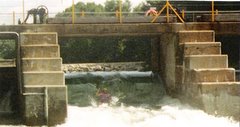
Gull River Water control at Horseshoe lake
A History of Navigation on the Kipawa River
Prior to the environmental assessment there was no signage at the Laniel Dam
T-Shirts Area: These are available now!

Send $25 and a stamped self addressed envelop for the Tshirt, and for the bumper sticker, a stamped and self addressed envelope with $5.00 for the bumper sticker to Les Amis de la rivière Kipawa, 80 Ontario St., Ottawa, Ontario, K1K 1K9 or click the link To purchase a Les Amis "T" contact Doug with the following information: Number of shirts:Sizes: Ship to Address: Method of Payment: cash, cheque and paypal, Shipto address:
Bumper Stickers Now Available

Get your bumper sticker and show your support for the Kipawa Legal Fund ! - send $5.00 in a Stamped, self addressed envelope to: Peter Karwacki Box 39111, Ottawa, Ontario, Canada, K1H 7X0







